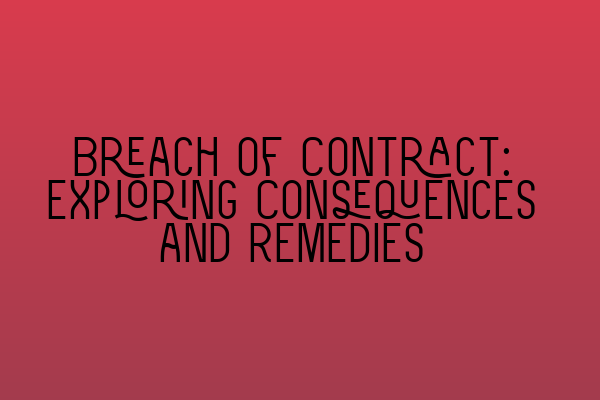Breach of Contract: Exploring Consequences and Remedies
Contracts are the foundation of business transactions and personal agreements. They establish the rights and duties of the parties involved and provide a framework for resolving any disputes that may arise. However, there are instances where one party fails to fulfill their obligations, resulting in a breach of contract.
In this blog post, we will explore the consequences of a breach of contract and the available remedies for the aggrieved party. Whether you’re a business owner, a consumer, or a professional, understanding these principles is essential to protect your interests and seek appropriate redress.
Consequences of a Breach of Contract
When a party breaches a contract, it can have various consequences depending on the terms of the agreement and the severity of the breach. Let’s delve into the possible repercussions:
1. Damages
One of the most common consequences of a breach of contract is the payment of damages. Damages are monetary compensation awarded to the injured party to compensate for the loss or harm suffered as a result of the breach. There are different types of damages, including:
- Compensatory Damages: These are designed to put the injured party in the position they would have been if the contract had been fulfilled. They aim to cover direct losses, such as financial losses or expenses incurred due to the breach.
- Consequential Damages: These damages go beyond the direct losses and cover the indirect or consequential damages resulting from the breach. For example, lost profits or damages to reputation.
- Punitive Damages: In rare cases, punitive damages may be awarded to punish the breaching party for their misconduct or deter others from engaging in similar behavior.
If you have suffered a breach of contract, consulting with a solicitor, such as those at SQE Contract Law, can help you assess the damages you may be entitled to and determine the best course of action.
2. Specific Performance
In certain situations, a monetary award may not be sufficient to remedy the harm caused by a breach of contract. Specific performance is an equitable remedy where the court orders the breaching party to perform their obligations as originally agreed. This remedy is often sought when the subject matter of the contract is unique or when monetary compensation is inadequate.
For example, if you hired a contractor to build a custom-made piece of furniture and they failed to deliver, specific performance may be sought to compel the contractor to complete the work as specified in the contract.
3. Rescission and Restitution
Rescission occurs when the court sets aside a contract due to a material breach by one party. This effectively cancels the contract, and the parties are released from their obligations. Additionally, the court may order restitution, whereby any benefits received by the breaching party are returned to the injured party.
Rescission and restitution aim to restore the parties to their pre-contractual positions and undo the effects of the breach.
Legal Remedies for a Breach of Contract
When faced with a breach of contract, pursuing legal remedies is often necessary to protect your rights and seek appropriate compensation. Here are some common legal remedies:
1. Litigation
If negotiations or alternative dispute resolution methods fail, litigation may be necessary. This involves taking the case to court, where a judge will decide on the merits of the breach and the appropriate remedies. Litigation can be time-consuming and expensive, so it’s important to consult with an experienced solicitor to assess your chances of success and explore alternative avenues before heading to court.
To learn more about navigating legal challenges and pitfalls in practice, check out this related article.
2. Mediation and Arbitration
Mediation and arbitration are alternative dispute resolution methods that offer a more cost-effective and expedited resolution compared to litigation. In mediation, a neutral third party facilitates negotiations between the parties to reach a mutually acceptable agreement. In arbitration, a neutral arbitrator hears the evidence and renders a binding decision. These methods can be less formal and more flexible than litigation, allowing for a quicker resolution.
3. Termination and Performance
Depending on the nature and terms of the contract, you may have the right to terminate the agreement due to the breach. Termination allows you to walk away from the contract and pursue other remedies, such as a claim for damages.
If the breach is minor and does not go to the heart of the contract, you may choose to continue performing your obligations while seeking damages for any loss suffered.
4. Negotiated Settlement
In some cases, parties may prefer to resolve a breach of contract through negotiation and settlement. This can be a more amicable approach, allowing the parties to reach a mutually beneficial resolution without resorting to formal legal proceedings. However, it is important to consult with a solicitor to ensure that any settlement agreement adequately protects your interests and rights.
Conclusion
A breach of contract can have significant consequences, both financially and operationally. Understanding the available remedies, such as damages, specific performance, rescission, restitution, and legal remedies like litigation or alternative dispute resolution, is crucial to protect your interests and seek appropriate redress.
If you are facing a breach of contract or require legal guidance on contract law matters, the solicitors at SQE Contract Law are here to help. Contact us today to schedule a consultation.
Related Articles:
